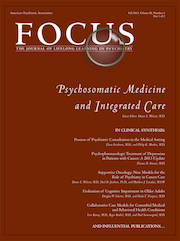From the Guest Editor: Psychosomatic Medicine: Possible Future Role in Supportive Care Medicine?
This issue provides a selected overview of the vital contributions psychosomatic medicine continues to make to U.S. health care delivery. Psychiatrists provide consultations to medically ill patients in the medical inpatient and ambulatory environments, thereby contributing to the comprehensive care of patients with medical and psychiatric comorbidity. The development, implementation, and testing of advanced models of collaborative care of medical patients with psychiatric comorbidities is a critically important advance. Psychosomatic medicine continues to make major contributions to the comprehensive, patient-centered, personalized care of patients with chronic medical disease, cancer, and those undergoing transplantation. Optimal psychopharmacologic care of patients with significant medical illness and comorbid psychiatric disorders requires high-level expertise and judgment. Psychiatrists also continue to make important contributions to neuropsychiatry, including the assessment and management of cognitive impairment.
The challenges and opportunities for psychosomatic medicine include:
| 1. | We must continue to develop, implement, and test standardized and reproducible clinical psychiatric/behavioral health care services models for the medically ill with psychiatric comorbidities that meet rigorous tests of being “high value” (effectiveness/cost) by the health care provider system. These services must be provided by multidisciplinary integrated psychiatrist/psychologist/other mental health professional teams that are fully embedded in the medical care delivery system. These services must provide care continuity longitudinally and within and across provider systems. | ||||
| 2. | We need to support the strongest possible clinical psychiatric/behavioral health care collaborations between hospital-based providers, community health care providers, and community and national patient and family education and support services providers. | ||||
| 3. | We must implement technology-based screening systems for both patient self-report distress and service needs to guide our delivery of personalized, patient-centered care. Our use of technology must be optimized to provide care most effectively and efficiently. | ||||
| 4. | We must significantly contribute to the clinical care provided to patients with very advanced disease and at the end-of-life. We need to become embedded components of the palliative care and hospice care delivery system. | ||||
| 5. | We must contribute to the best possible patient medical, psychiatric/behavioral, and quality of life outcomes as advancing science and technology (e.g., total artificial heart, regenerative medicine, targeted therapies in cancer treatment) transform leading edge medical care. | ||||
Psychiatry and its subspecialty psychosomatic medicine face profound challenges in this time of profound health care delivery system and reimbursement system change. Our health care system particularly needs improved comprehensive and integrated care delivery models for patients with chronic potentially life-threatening disease (e.g., cancer), organ transplant recipients, and those approaching the end of life. These enhanced care delivery models need to include psychosomatic medicine psychiatrists who work with these populations.
A number of nationally leading cancer centers have changed their service name to some variant of supportive care medicine. Some large teaching hospitals are considering establishing supportive care medicine programs, with the goal of further integrating their care of chronic disease populations. A supportive care medicine service would include multispecialty physician providers such as psychiatrists and hospice and palliative care physicians, and other clinicians. An integrated supportive care medicine service may contribute to improved clinical care and to enhanced educational and research collaboration. These services may provide another opportunity for psychosomatic medicine psychiatrists to more visibly contribute to the effectiveness of the U.S. chronic disease care system.



